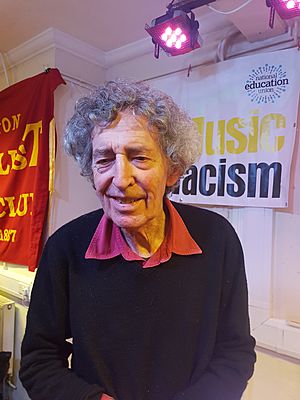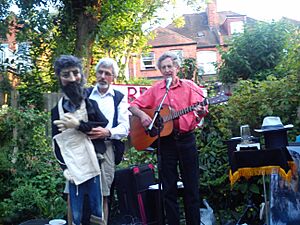Leon Rosselson facts for kids
Leon Rosselson was born on June 22, 1934, in Harrow, England. He is a talented English songwriter and also writes books for children. Leon became well-known in the early 1960s for singing his own funny and clever songs. He appeared on a popular TV show called That Was The Week That Was. He traveled around Britain and other countries, performing his songs and playing his acoustic guitar.
Later in his career, Leon Rosselson wrote 17 children's books. His first book, Rosa's Singing Grandfather, was even nominated for the Carnegie Medal in 1991.
Today, he still writes and performs his songs. He often works with other musicians and performers. Many of his songs use humor to talk about important social issues.
Contents
Leon Rosselson's Early Life
Leon Rosselson grew up in North London. His parents came to England as refugees from the Russian Empire.
He went to Cambridge University to study. When he was a teenager and in his twenties, he was a very good chess player. He even played for his school, county, and university teams.
Leon Rosselson's Folk Music Journey
Leon Rosselson started getting involved in folk music while he was at Cambridge University. He joined the university's folk music club. This is also when he began writing his own songs.
He joined the London Youth Choir and traveled to different festivals in the 1950s.
The Galliards Group
In the late 1950s, Leon Rosselson joined a music group called The Galliards. The group included Robin Hall, Jimmie Macgregor, and Shirley Bland. Leon played the five-string banjo and guitar. He also helped arrange their folk songs.
The Galliards recorded several albums and a single. The group stopped performing together in 1963.
The Three City Four
In 1964, Leon Rosselson joined another group called The Three City Four. This group focused on new songs, including some of Leon's own. They recorded two albums before the group changed its members.
Leon Rosselson and That Was The Week That Was
A new kind of TV show started in Britain on November 24, 1962. It was a late-night Saturday show called That Was The Week That Was. This show used humor to talk about current events. Leon Rosselson's early funny songs were featured on this program. The show was very popular and ran until 1963.
Songs for City Squares
During this time, Leon wrote a song called "Tim McGuire." It was about someone who liked to play with fire. This song was played on BBC radio. Some people complained about it, but the BBC decided not to ban the song. They said it was okay because the character in the song eventually gets caught.
Working with Roy Bailey
Leon Rosselson worked with another folk singer named Roy Bailey on several albums. Their first album together was Hugga Mugga in 1971. They also recorded That's Not The Way It's Got To Be in 1975. Two more albums followed: Love, Loneliness and Laundry (1977) and If I Knew Who the Enemy Was (1979).
Leon also wrote two shows for Roy Bailey and Frankie Armstrong to perform. One was about being against nuclear weapons. The other was about personal feelings and relationships.
Famous Songs by Leon Rosselson
Many other artists have performed Leon Rosselson's songs. Billy Bragg helped make "The World Turned Upside Down" a popular song in 1985. Dick Gaughan also performed this song and "Stand Up for Judas". The Dubliners recorded Don't Get Married in 1987.
Martin Carthy included Leon's song "Palaces of Gold" on his 1976 album Crown of Horn. This song was about the Aberfan disaster, a sad event where a coal waste pile collapsed.
Big Red Songs
The Big Red Songbook was a collection of songs about social issues. It first came out in 1977. Leon Rosselson created a new version of this collection called The New Big Red Songbook in 2003.
The Spycatcher Song
In 1987, a book called Spycatcher was not allowed to be published or quoted in Britain. Leon Rosselson decided to write a song about it. He read the book and then wrote "Ballad of a Spycatcher." This song was published in a British magazine.
A single of the song was released with help from Billy Bragg and Oysterband. It even started to be played on the radio. Leon thought he might get into trouble, but nothing happened. The song became popular and reached number 7 on the NME indie singles charts.
Leon Rosselson: Children's Author
Leon Rosselson has written 17 books for children. His first book, Rosa's Singing Grandfather, was published by Puffin. It was nominated for the Carnegie Medal in 1991.
His most recent novel, Home is a Place Called Nowhere, tells the story of what it's like to be a refugee.
Discography
The Galliards
- The Galliards (EP) (1960)
- Scottish Choice (1961)
- A-Rovin' (1961)
- Galliards (1962)
The Three City Four
- The Three City Four (1965)
- Smoke and Dust (Where the Heart Should Have Been) (1967)
- Smoke and Dust (CD) (Compilation of tracks from above two albums, released 2010)
Solo Recordings
- Songs for City Squares (EP) (1962)
- Songs for Sceptical Circles (1966)
- A Laugh, a Song and a Hand Grenade (with Adrian Mitchell) (1968)
- Word Is Hugga Mugga Chugga Lugga Hum Bugga Boom Chit (1971)
- Palaces of Gold (1975)
- That's Not the Way It's got to Be (with Roy Bailey) (1975)
- Issued in the US as Songs of Life from a Dying British Empire (1981)
- Love Loneliness and Laundry (with Roy Bailey) (1977)
- If I Knew Who the Enemy Was (with Roy Bailey) (1979)
- For the Good of the Nation (Live, 1981)
- Temporary Loss of Vision (1983)
- Bringing the News from Nowhere (1986)
- "Ballad of a Spycatcher"/"Song of the Free Press" (single with Billy Bragg and The Oyster Band) (1987)
- I Didn't Mean It (with Frankie Armstrong, Roy Bailey, Billy Bragg, Martin Carthy, John Kirkpatrick, Rory McLeod, The Oyster Band and Fiz Shapur) (1988)
- Wo Sind Die Elefanten? (Where Are The Elephants?) (1991)
- Intruders (1995)
- Harry's Gone Fishing (1999)
- The Last Chance (EP: 4 song CD) (2002)
- A Proper State (2008)
- The Liberty Tree (with Robb Johnson) (2010)
- Where Are The Barricades? (2016)
Compilation Albums
- Rosselsongs (1990)
- Guess What They're Selling at the Happiness Counter (1992)
- Perspectives (1997)
- Turning Silence into Song (2004)
- The Last Chance (extended edition of the 2002 EP of the same name) (2010)
- The World Turned Upside Down – Rosselsongs 1960–2010 (2011)
For Children
- Questions: Songs and Stories for Children (1994) (Cassette only. Reissued on CD, 2006)
- Five Little Frogs (with Sandra Kerr, Nancy Kerr and Kevin Graal)
- Five Little Owls (with Sandra Kerr, Nancy Kerr and Kevin Graal)
- The Greatest Drummer in the World
Other Recordings
- Songs for Swinging Landlords To (with Stan Kelly) (1961)
- Vote For Us (with numerous other artists) (1964)
- Nuclear Power No Thanks (with numerous other artists) (1981)
- And They All Sang Rosselsongs (sung by 15 other performers) (2005)
In 2009, the song "Greedy Landlord" was included in a special 70-year anniversary music collection by Topic Records.
See Also
- Political Song Network
 | Janet Taylor Pickett |
 | Synthia Saint James |
 | Howardena Pindell |
 | Faith Ringgold |



